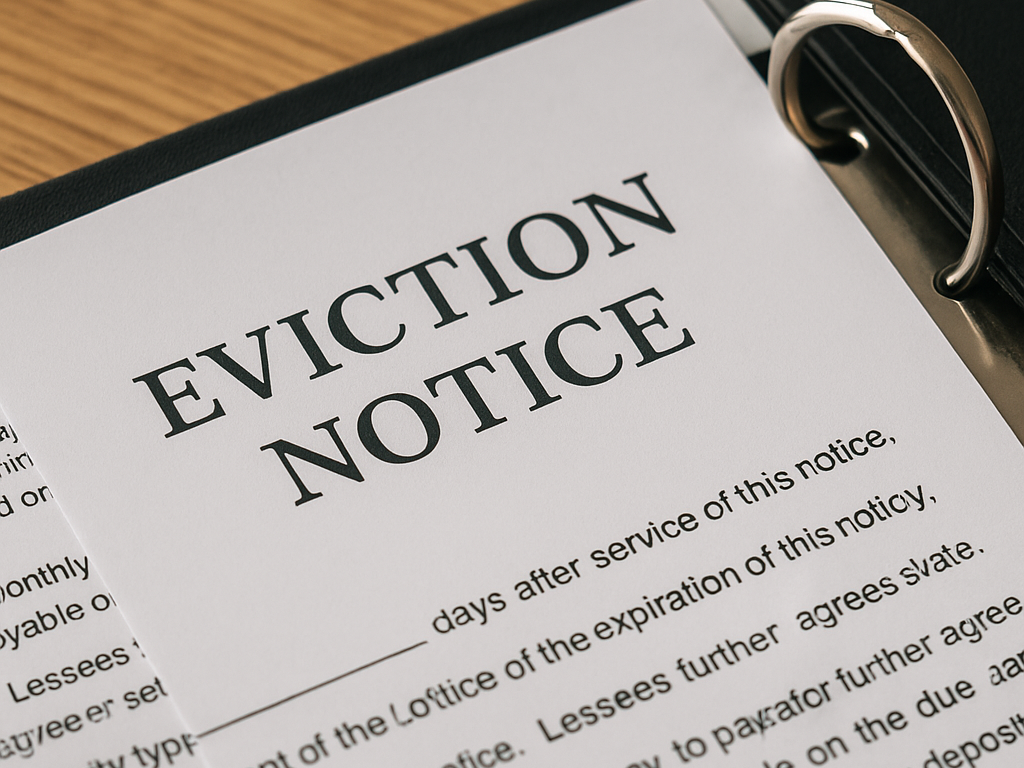
How to Evict a Non-Paying Tenant (and Why You Should Try to Avoid It First)
Evicting a tenant is never easy — emotionally, financially, or legally. As property managers, we understand how frustrating it is when rent stops coming in, but eviction should always be the last resort. The process is time-consuming, expensive, and often avoidable with proactive communication and documentation.
Start With Every Effort to Avoid Eviction
Before starting the formal eviction process, take these steps:
- Communicate early and often – Reach out the moment rent is late. Most tenants don’t want to be in default and may appreciate your willingness to work with them.
- Offer a payment plan – A structured catch-up plan with clear deadlines can keep cash flow coming while avoiding court.
- Request hardship documentation – If your tenant claims financial hardship, ask for supporting documents. This allows you to evaluate sincerity and plan ahead.
- Send a formal courtesy notice – A well-worded letter may motivate a tenant to act before a 3-day notice becomes necessary.
If these efforts fail and the tenant remains behind on rent, you may need to initiate the eviction process.
How to Evict a Non-Paying Tenant in California
California has strict procedures for lawful eviction, and any misstep can delay your case or get it thrown out altogether. Here’s how the process works:
1. Serve a 3-Day Notice to Pay Rent or Quit
This is the legal notice required to begin an eviction for nonpayment of rent. It must:
- Be in writing
- Clearly state the amount owed
- Offer three calendar days to pay or vacate
- Be properly served (personally, by substitute service, or posting and mailing)
Note: Email or text alone does not qualify as proper notice.
2. Wait the Notice Period
If the tenant pays in full during the 3-day window, the eviction stops. If not, you can proceed to court.
3. File an Unlawful Detainer Lawsuit
File your eviction case in the local Superior Court. This officially begins the legal process.
4. Serve the Court Papers
A process server or third party must legally serve the tenant. They then have 5 court days to respond.
5. Attend the Court Hearing
If the tenant contests the eviction, a hearing is scheduled. If they don’t respond, you may request a default judgment.
6. Judgment and Sheriff Lockout
If the judge rules in your favor, the sheriff posts a 5-Day Notice to Vacate. If the tenant still doesn’t leave, the sheriff will conduct the lockout.
Eviction Timelines: Best Case vs. Worst Case
Best Case (Uncontested):
- 3-Day Notice: 3 calendar days
- File & Serve Court Papers: 5–7 days
- No response: Default judgment in 10–14 days
- Sheriff Lockout: 7–10 days
Estimated Total: 21–30 days
Worst Case (Contested or Delayed):
- 3-Day Notice: 3 calendar days
- Filing & Service Delays: 7–14 days
- Tenant contests eviction: +20–30 days or more
- Trial & Lockout: +10–15 days
Estimated Total: 45–75+ days
Eviction Costs: Best Case vs. Worst Case
Best-Case Scenario (Uncontested):
- Court filing fee: $385–$450
- Process server: $75–$150
- Sheriff lockout fee: ~$145
- Attorney (optional flat fee): $500–$1,200
- Property manager time/admin fee: Varies
Estimated Total: $700 – $1,800
Worst-Case Scenario (Contested):
- All of the above, plus:
- Attorney litigation fees: $2,000–$5,000+
- Missed rent (2–3 months): $5,000–$10,000+
- Turnover/repairs: $500–$3,000
- Vacancy loss: $2,000–$4,000
Estimated Total: $10,000 – $20,000+
These estimates are based on typical costs in Los Angeles County and surrounding areas. They may vary by property type, location, or the complexity of the case.
Final Thoughts
Eviction should always be the final option after other efforts to resolve the issue have failed. Each case is unique, and a misstep in the process could cost you time and money. Consult with a qualified landlord-tenant attorney before starting any eviction to ensure compliance with California law.
At Initial Property Management, we take great pride in guiding property owners through these challenging situations with professionalism, empathy, and precision. Our goal is to protect your investment while maintaining fairness and integrity every step of the way.
Need help managing a difficult tenant or navigating California’s complex rental laws?
We’re here to support you. Schedule a consultation with our team to learn more about our full-service property management solutions.
